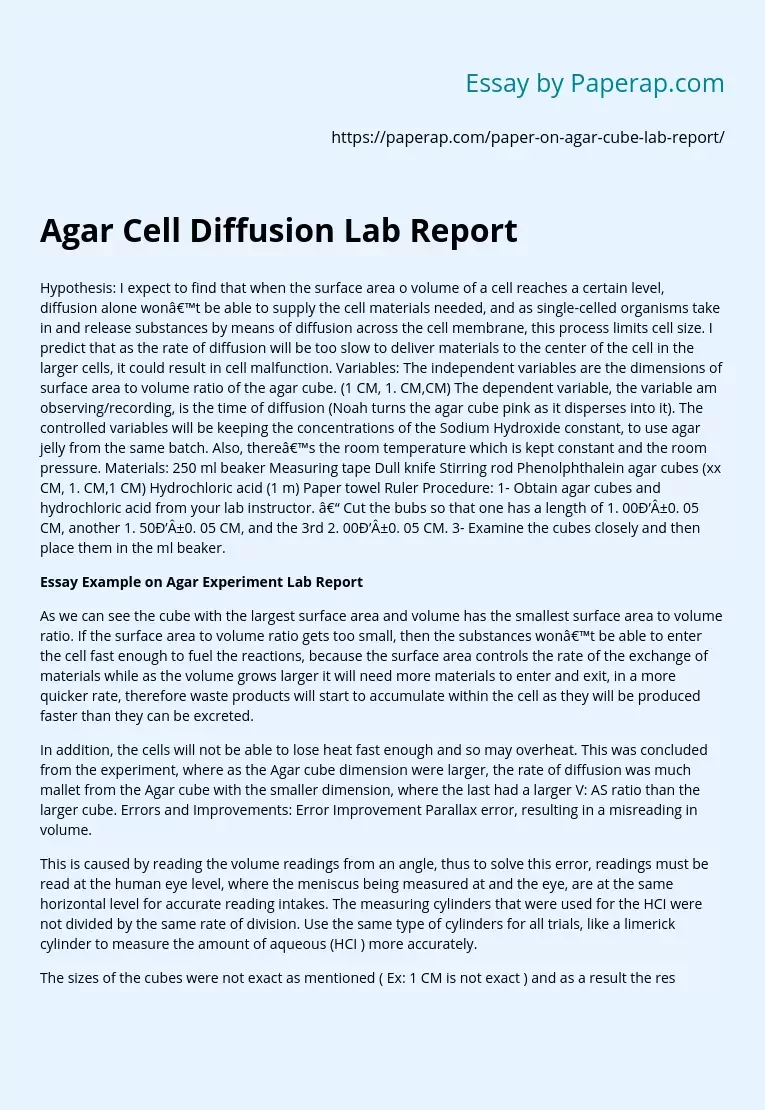Agar Cell Diffusion Lab Report
Hypothesis: I expect to find that when the surface area o volume of a cell reaches a certain level, diffusion alone won’t be able to supply the cell materials needed, and as single-celled organisms take in and release substances by means of diffusion across the cell membrane, this process limits cell size. I predict that as the rate of diffusion will be too slow to deliver materials to the center of the cell in the larger cells, it could result in cell malfunction.
Variables: The independent variables are the dimensions of surface area to volume ratio of the agar cube. (1 CM, 1. CM,CM) The dependent variable, the variable am observing/recording, is the time of diffusion (Noah turns the agar cube pink as it disperses into it). The controlled variables will be keeping the concentrations of the Sodium Hydroxide constant, to use agar jelly from the same batch. Also, there’s the room temperature which is kept constant and the room pressure.
Materials: 250 ml beaker Measuring tape Dull knife Stirring rod Phenolphthalein agar cubes (xx CM, 1. CM,1 CM) Hydrochloric acid (1 m) Paper towel Ruler Procedure: 1- Obtain agar cubes and hydrochloric acid from your lab instructor. – Cut the bubs so that one has a length of 1. 00В±0. 05 CM, another 1. 50В±0. 05 CM, and the 3rd 2. 00В±0. 05 CM. 3- Examine the cubes closely and then place them in the ml beaker.
Essay Example on Agar Experiment Lab Report
As we can see the cube with the largest surface area and volume has the smallest surface area to volume ratio.
If the surface area to volume ratio gets too small, then the substances won’t be able to enter the cell fast enough to fuel the reactions, because the surface area controls the rate of the exchange of materials while as the volume grows larger it will need more materials to enter and exit, in a more quicker rate, therefore waste products will start to accumulate within the cell as they will be produced faster than they can be excreted.
In addition, the cells will not be able to lose heat fast enough and so may overheat. This was concluded from the experiment, where as the Agar cube dimension were larger, the rate of diffusion was much mallet from the Agar cube with the smaller dimension, where the last had a larger V: AS ratio than the larger cube. Errors and Improvements: Error Improvement Parallax error, resulting in a misreading in volume.
This is caused by reading the volume readings from an angle, thus to solve this error, readings must be read at the human eye level, where the meniscus being measured at and the eye, are at the same horizontal level for accurate reading intakes. The measuring cylinders that were used for the HCI were not divided by the same rate of division. Use the same type of cylinders for all trials, like a limerick cylinder to measure the amount of aqueous (HCI ) more accurately.
The sizes of the cubes were not exact as mentioned ( Ex: 1 CM is not exact ) and as a result the results obtained may not be very accurate. When cutting, a more precise instrument must be used. If no other instrument is found, a more sharper knife can be used accompanied with a more specific ruler. Injury of the surface of the cubes due to hard stirring by the rod. Stir at a slower rate for a longer time than stirring hard for a little time, in addition to that a thinner rod can be used for stirring.
Agar Cell Diffusion Lab Report. (2019, Nov 27). Retrieved from https://paperap.com/paper-on-agar-cube-lab-report/

